Just In
- 2 hrs ago

- 6 hrs ago

- 7 hrs ago

- 12 hrs ago

Don't Miss
- Finance
 Swing Trading Guide: 2 Buy/Sell Stock Picks By VLA Ambala On Friday, 19th April
Swing Trading Guide: 2 Buy/Sell Stock Picks By VLA Ambala On Friday, 19th April - Movies
 Bade Miyan Chote Miyan Box Office Day 9 Prediction: Akshay’s Film To Cross 51Cr Ahead Of 2nd Weekend
Bade Miyan Chote Miyan Box Office Day 9 Prediction: Akshay’s Film To Cross 51Cr Ahead Of 2nd Weekend - Sports
 LSG vs CSK IPL 2024: Four Batters Who Can Score Most Runs in Match 34
LSG vs CSK IPL 2024: Four Batters Who Can Score Most Runs in Match 34 - News
 12 Jurors Picked For Donald Trump’s Hush Money Trial, Alternate Selection Continues
12 Jurors Picked For Donald Trump’s Hush Money Trial, Alternate Selection Continues - Automobiles
 Aprilia RS 457 Accessories: A Detailed Look At The Prices
Aprilia RS 457 Accessories: A Detailed Look At The Prices - Education
 Karnataka SSLC Result 2024 Soon, Know How to Check Through Website, SMS and Digilocker
Karnataka SSLC Result 2024 Soon, Know How to Check Through Website, SMS and Digilocker - Technology
 Nothing Ear, Ear a With ANC, Up to 42.5 Hours of Battery Launched; Check Price and Availability
Nothing Ear, Ear a With ANC, Up to 42.5 Hours of Battery Launched; Check Price and Availability - Travel
Telangana's Waterfall: A Serene Escape Into Nature's Marvels
Why Do Hindus Worship Cows?
Cows have been a point of controversy from time immemorial. Cow slaughtering is one of the major religious issues which sparks off instant riots in the country. Pictures are shared all over social media channels to save cows and how cows are sacred animals. But do we know the real reason why Hindus worship cows? Let us find out.
Cow has always been a useful animal to mankind. A source of the life giving milk and milk products, the cow serves many purposes in a household. The cow remains a protected animal in Hinduism today and Hindus do not eat beef. Most rural Indian families have at least one dairy cow, who is often treated as a member of the family.
Hinduism treats cows as Goddesses. Cow is considered a maternal figure who takes care like a mother and hence killing a cow is considered one of the most sinful act. It would be interesting to note that during the Vedic period, cows were sacrificed during the yagnas. Later, circumstances led to the inference that cow must be regarded as a sacred being which needs to be protected.
Take a look at these few reasons why Hindus regard cows as sacred and why they are worshipped by most people.
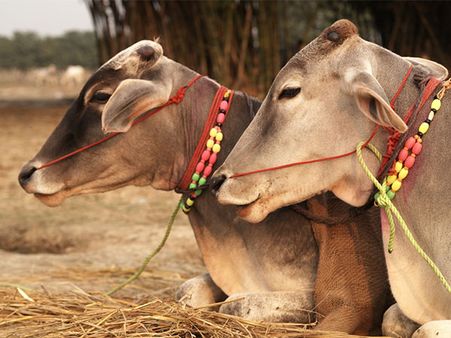
The Privileges
The five products (panchagavya) of the cow - milk, curd, ghee, urine and dung - are all used in puja as well as in rites of extreme penance. The milk of the family cow nourishes children as they grow up, and cow dung (gobar) is a major source of energy for households throughout India. Cow dung is also rich in minerals, and makes an excellent fertilizer.
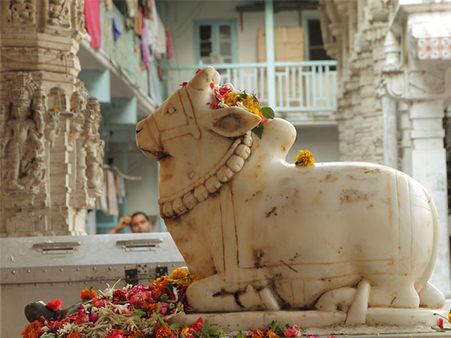
The Yagnas
Yagnas are a common practice in India. Spiritual "yagnas" are fire ceremonies that performed to thank the Gods and receive their blessings. Cows even play a central role in these fire yagnas or Agnihotras. Scientific research has found that the ritual of burning cow dung and ghee as fuel for these sacred fires, actually purifies the air and has anti-pollutant and anti-radiation qualities in the environment.
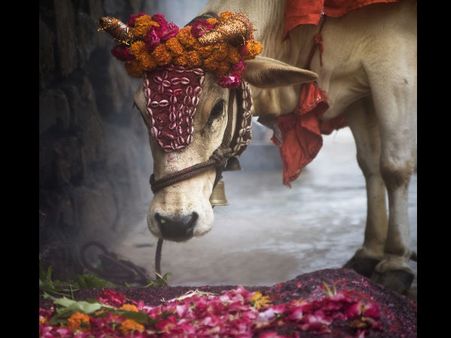
Panchamrit: The Elixir
There are many health conditions identified by the science of Ayurveda in which only herbs are not enough as a cure. They need the deeper and subtler healing of these types of Vedic ritual ceremonies to clear astrological past karma. The holy cow again offers its bounty by providing the ingredients in the Panchamrit, or blessed drink, that is distributed after the ceremony.Panchamrit translates as "sacred ambrosia" or "nectar of the gods" and is made up of 5 items - milk, yogurt, ghee, honey and sugar. By drinking this sweet prasadam, one is infused with the divine energy created during the puja, and is healed.
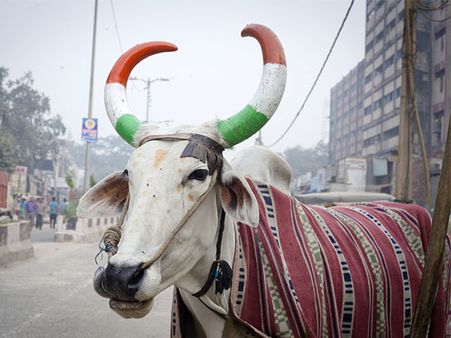
Why Hindus Don't Eat Beef
In ancient Hindu texts, Lord Krishna, one of the most prominent figures in the Hindu religion, is portrayed as a cowherd, making the cow immensely sacred to Hindus who worship Lord Krishna. Lord Krishna is often called by the name Bala Gopala. The literal meaning here translates to "the boy who protects cows".
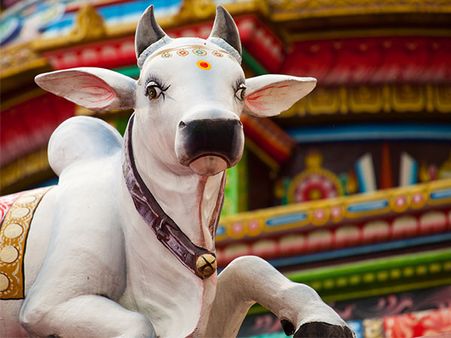
The Gau Mata
According to the sage Veda Vyasa who wrote the Mahabharata, the cow is symbolic of the maternal qualities of the planet earth. This again is associated with the Vedas and Lord Krishna, for Lord Krishna was central to the entire story of Mahabharata.
-
 insync100 Popular Hindu Baby Names For Girls And Boys That Start With The Letter M
insync100 Popular Hindu Baby Names For Girls And Boys That Start With The Letter M -
 yoga spiritualityWhen Is Magh Pradosh Vrat 2024? Date, Shubh Muhurat, Puja Vidhi, Mantra, And Remedies Related To Lord Shiva
yoga spiritualityWhen Is Magh Pradosh Vrat 2024? Date, Shubh Muhurat, Puja Vidhi, Mantra, And Remedies Related To Lord Shiva -
 yoga spiritualityFebruary 2024 Festival List: Check Full List For Indian Festivals And Vrats
yoga spiritualityFebruary 2024 Festival List: Check Full List For Indian Festivals And Vrats -
 yoga spiritualityPaush Purnima 2024 Remedies: Try These Upay For Peace, Prosperity, Money And Happiness In Life
yoga spiritualityPaush Purnima 2024 Remedies: Try These Upay For Peace, Prosperity, Money And Happiness In Life -
 yoga spiritualityWhen Will Pran Pratishtha Happen In Ayodhya Ram Mandir? Significance Of Pran Pratishtha In Hinduism
yoga spiritualityWhen Will Pran Pratishtha Happen In Ayodhya Ram Mandir? Significance Of Pran Pratishtha In Hinduism -
 yoga spirituality‘Saat Phere' Mandatory In Hindu Marriage, Rules Allahabad Court: Know Meaning Of 7 Pheras (Auspicious Rounds)
yoga spirituality‘Saat Phere' Mandatory In Hindu Marriage, Rules Allahabad Court: Know Meaning Of 7 Pheras (Auspicious Rounds) -
 yoga spiritualityTulsidas Jayanti 2023: Date, History, Significance, And Celebrations
yoga spiritualityTulsidas Jayanti 2023: Date, History, Significance, And Celebrations -
 yoga spiritualityNuh Violence In Haryana: Importance Of Religious Procession In Hinduism, What The Indian Constitution Says
yoga spiritualityNuh Violence In Haryana: Importance Of Religious Procession In Hinduism, What The Indian Constitution Says -
 yoga spiritualityHindu Temples - Know The Spiritual Significance And Symbolism
yoga spiritualityHindu Temples - Know The Spiritual Significance And Symbolism -
 yoga spiritualityVadapalli Narasimha Swamy Temple, Nalgonda: Where The Lord's Breath Is Felt!
yoga spiritualityVadapalli Narasimha Swamy Temple, Nalgonda: Where The Lord's Breath Is Felt! -
 yoga spiritualityEka Sloki Ramayanam: Meaning And Benefits Of Reading The Ramayana In One Shloka!
yoga spiritualityEka Sloki Ramayanam: Meaning And Benefits Of Reading The Ramayana In One Shloka! -
 yoga spiritualityNavabrindavanam - History And Significance Of The Tombs of The Nine Saints!
yoga spiritualityNavabrindavanam - History And Significance Of The Tombs of The Nine Saints!


 Click it and Unblock the Notifications
Click it and Unblock the Notifications



